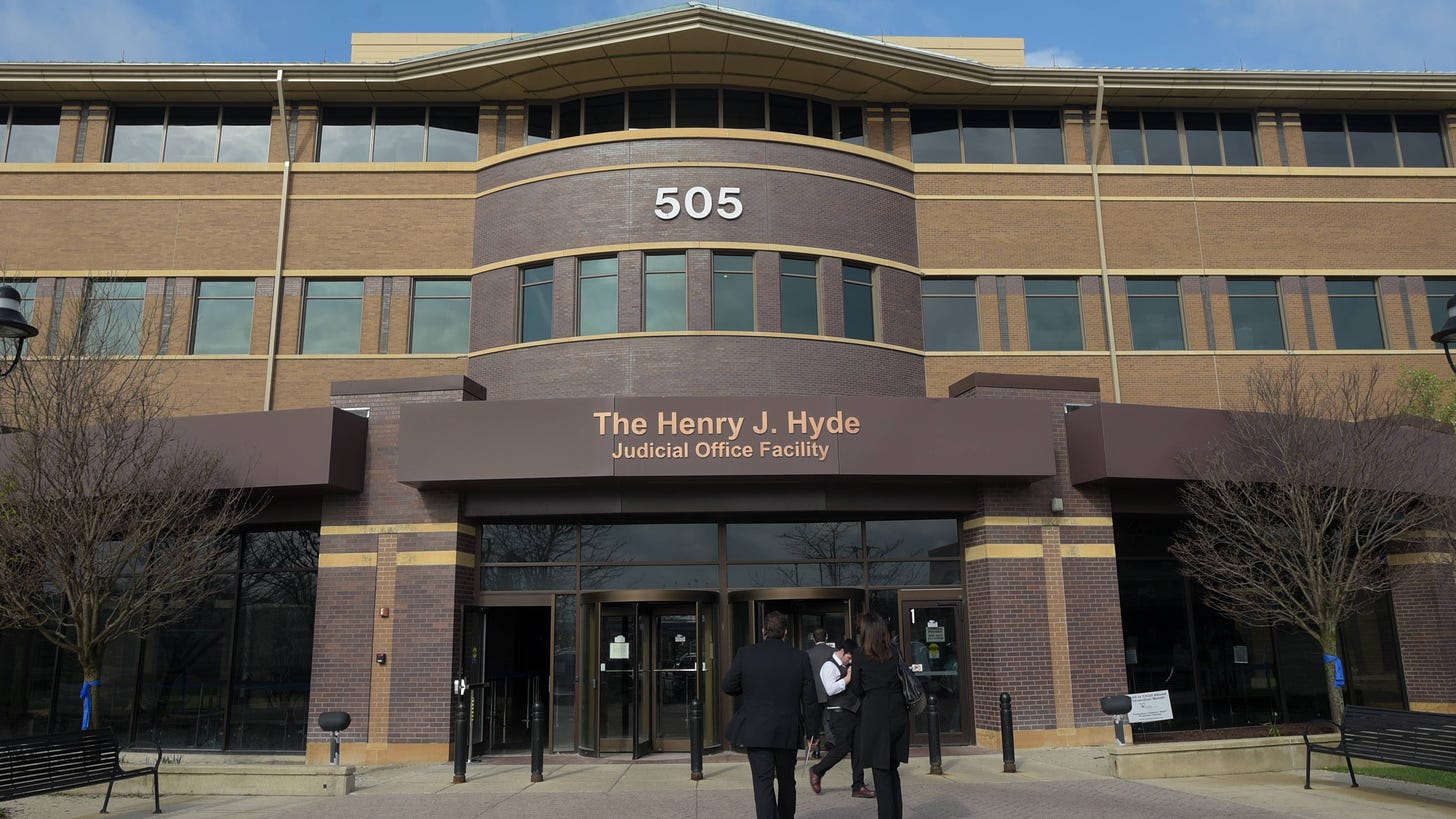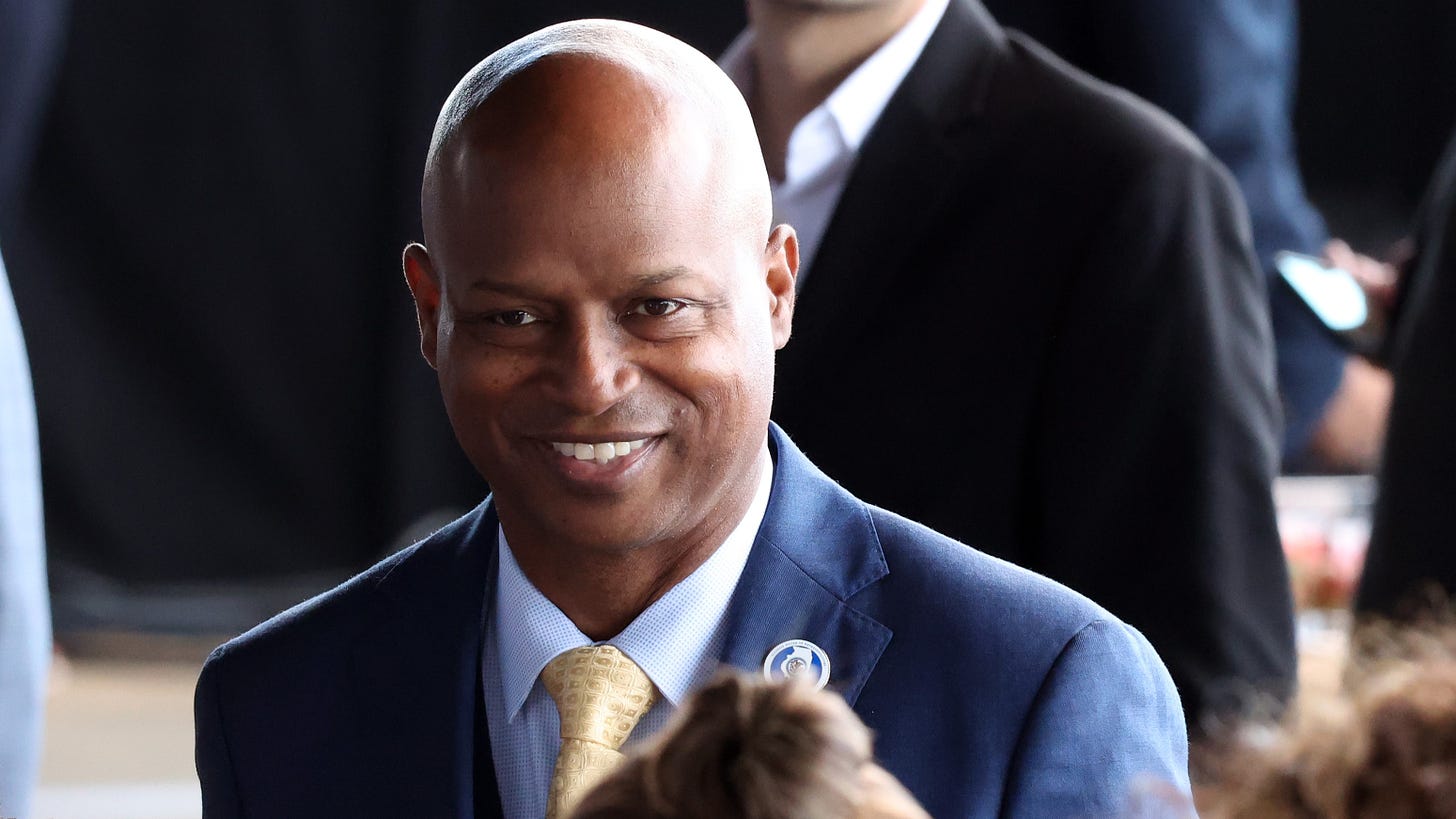THE ILLINOIZE: Monday Free for All...New cash-free bail system begins today...The battle for Speaker's staff to unionize...Concern over day care funding
September 18, 2023
Good morning, Illinois.
Between the Illini and the Bears, my weekends just cleared up a bit. Who’s up for some fall golf?
Obviously, the big news today is the end of the cash bail system in Illinois courts. Instead of sitting here opining on the unknown, I’m planning to sit in a suburban courtroom this morning and watch it play out first hand. I’ll report back for subscribers tomorrow.
That said, the best way to show your support for our little newsletter corner of the internet is to become a paid subscriber. Paid subscribers get the full, original reporting and opinion content on Tuesdays, Wednesdays, and Fridays. It’s well worth the small fee. Click below to join us!
The House and Senate are out until late October. The Governor has nothing on his public schedule. He’s been out of sight for 11 days.
Let’s get to it.
YOUR MONDAY FREE FOR ALL
(note: we’re not responsible for paywalls and restrictions from other news outlets, because good journalism isn’t free)
New bail reform ‘isn’t going to be perfect,’ court players and advocates say as changes are set to take effect (Chicago Tribune)
[A]fter a nine-month delay due to litigation from prosecutors across Illinois who opposed the law [ending cash bail], the reforms will be rolled out Monday, a seminal moment for the state after years of debate over how to keep the public safe and create an equitable criminal justice system.
Those who work in that system told the Tribune they expect a little mayhem at the outset but tell of countless stakeholder meetings over the two-year preparation period ordered by the legislature.
They expect the reforms will be watched closely. Though a number of jurisdictions have eliminated or reduced cash bail in some form, Illinois is the first state to fully eliminate it legislatively and is a trailblazer in that respect.
The cash-bail measure, passed as part of the sweeping SAFE-T Act, has been controversial for those concerned about the public safety impact of the provisions — particularly Republicans. Opponents of Gov. J.B. Pritzker have sought to paint him and his Democratic allies as weak on crime — though studies of bail-reform measures in other jurisdictions have not shown a significant effect on recidivism or failure by defendants to appear in court.
Proponents of the law have long argued that cash bail deepened disparities in the system by disproportionately jailing people too poor to make bail, though some progressive advocates are citing concern about the law leading to an overreliance on electronic monitoring.
“Remember, the system we have today isn’t a perfect system. The system we’ll have on Sept. 18, 19 isn’t going to be perfect either,” said Amanda Pyron, an advocate for survivors of gender-based violence who helped shape the law. “We have to see if this system is going to be a little less imperfect than before …. That’s going to take a little time.”
Under the new system, there will be an “initial appearance” court call, where defendants will mostly be released with conditions, such as regular check-ins with authorities, as well as a court call for detention hearings made up of the more serious cases in which prosecutors seek to keep defendants incarcerated while they await trial.
Those hearings will be longer, with defense attorneys able to call witnesses to speak on behalf of the arrestee.
“We’re expecting them to be a little more in depth than the current 60-second bond hearing,” said Takenya Nixon, an attorney supervisor for the Cook County public defender’s office. “It’s … no longer one-sided.”
In Lake County, prosecutors have begun submitting hearing requests for some of the county’s 50 pending murder cases, State’s Attorney Eric Rinehart said.
Judges ultimately will have to rule on whether the law extends retroactively to such cases, he said.
The hearings should result in more dangerous people being incarcerated because they won’t be able to pay money to get out, as happened in one pending case where a man shot someone after posting bail, Rinehart said.
The requirement for a hearing within 48 hours also should help to gather and clarify evidence early in the case, Rinehart said, which should help speed up the entire process and make it more fair.
Related: Ahead of cash bail’s end, state’s replacement pretrial justice system takes shape (Capitol News Illinois)
Bail reform can protect victims of domestic, sexual violence, activists say (Chicago Sun-Times)
Disparately resourced public defenders prepare for the end of cash bail in Illinois (Capitol News Illinois)
Moving beyond bail: How suburban court officials have prepared for controversial change (Daily Herald)
How Central Illinois courts and cops are preparing for the end of cash bail (Bloomington Pantagraph)
Downstate leaders say they will need help handling the historic end to cash bail (WBEZ)
Opinion: Court actors must implement SAFE-T Act for crime survivors (Shaw Media)
Opinion: Bond abolition and whatever comes with it arrives Monday (Champaign News-Gazette)
Chesney: Nothing in Illinois’ SAFE-T Act improves public safety (Rockford Register-Star)
Illinois House Speaker’s staff could test limits of Workers’ Rights Amendment (Capitol News Illinois)
Efforts to form a union by staff in House Speaker Emanuel “Chris” Welch’s office could provide an early and unexpected test of the new Workers’ Rights Amendment to the Illinois Constitution.
Brady Burden, a staffer in the speaker’s office who is part of the organizing committee of the Illinois Legislative Staff Association, said efforts to unionize have thus far been stymied by a provision in state law that specifically exempts the General Assembly from the Illinois Public Labor Relations Act.
But there is no such exemption in the Workers’ Rights Amendment, approved by voters less than a year ago. That addition to the state’s constitution provides, in part, that all employees have a “fundamental right” to organize and engage in collective bargaining over wages, hours and working conditions.
But at least one expert in Illinois labor law says relying on that amendment may be more difficult legally for the workers than it might first appear.
“Anytime this (constitutional amendment) is going to be litigated, if ever, it's going to require some degree of interpretation. It just will because it’s just not clear,” said Michael LeRoy, a professor at the University of Illinois College of Law and the School of Labor and Employment Relations. “It's not exactly clear what this means.”
According to Burden, efforts to form a union began last year but they did not go public with their campaign until May. He said well over half of the 38 employees who would be part of the bargaining unit – analysts, researchers and people who work with legislators – have signed a petition calling to form a union, which would be enough for automatic recognition by most other public employers.
Among the issues they’d like to negotiate, Burden said, are wages and hours. He said the starting salary for Democratic House staffers is around $43,000 annually, which he said is significantly lower than comparable jobs in the Senate or even for House Republican staff. He also said they would like better compensation for overtime.
Legislative staff jobs are exempt from wage and hour laws, so those workers do not receive the standard time-and-a-half when they work more than 40 hours in a week – which they do routinely during legislative sessions. Instead, Burden said, they receive roughly one hour of comp time for every three hours of overtime they work.
But because current law specifically exempts the General Assembly from the definition of a “public employer,” Burden said they are asking Welch to recognize their union voluntarily.
Welch’s office, however, has said he prefers they hold an election because recognizing the union voluntarily would deny staff the chance to weigh in on which organization they’d like to represent them.
Burden said that can’t be done because of the exemption in current state law, leaving them with the options of voluntary recognition or a lawsuit.
“It's in the Constitution. We have a right to organize,” Burden said. “The only issue that we need, is that the speaker recognize the union.”
Chris Welch: union buster is not something I had on my 2023 Illinois politics bingo card.
Parents worry as day care centers face funding crisis (Chicago Sun-Times)
[M]any Chicago parents [are concerned] as pandemic-era federal funding that helped stabilize the child care industry expires Sept. 30, triggering a crisis for providers and the families who depend on them.
For Illinois, that could mean nearly 130,000 kids without child care, about 2,800 shuttered centers and over 11,300 child care providers without jobs, according to a study from the Century Foundation, a think tank headquartered in New York.
“We have long had child care challenges in this country, well before the pandemic,” said Julie Kashen, director for women’s economic justice at the Century Foundation.
“You’ve got parents paying too high a price, you’ve got early educators being paid poverty-level wages. So you start with this broken, unaffordable market and a scarcity of child care programs at the same time. Then the pandemic came along,” said Kashen.
The industry faced collapse as centers had to close due to COVID-19. In response, the federal government provided states $24 billion to bolster the child care sector through the American Rescue Plan in 2021.
Those funds stabilized and ultimately saved child care businesses in Illinois, advocates, policy experts, child care providers and parents told the Chicago Sun-Times. Without them, the industry once again risks collapse.
“It worked. It did what it was supposed to do. Child care programs were able to keep their doors open to continue to serve children. They were able to raise wages for the early educators, at least temporarily,” Kashen said.
“It made a huge difference. And it gave us a view of what it could look like if we actually built the system that families need,” she said.
LAST WEEK FROM THE ILLINOIZE.COM
POLITICAL POTPOURRI
How suburban governments are dealing with their own labor shortage (Daily Herald)
Cook County official found pandemic’s upside — a chance to double dip (Chicago Sun-Times)
Mayor Brandon Johnson says elected officials should be held to high standard as he sidesteps questions about Chicago Treasurer Conyears-Ervin (Chicago Tribune)
Stellantis says it proposed 'compelling' offer that addressed future of idled Belvidere plant (Crain’s Chicago Business)
What to know about the Chicago Bears’ possible move from Soldier Field — and which other suburbs are vying for the stadium (Chicago Tribune)
DCFS workers on trial over AJ Freund’s death won’t testify; defense rests without calling witnesses (Shaw Media)
Opinion: Regardless of legal blame, all systems ultimately failed AJ (Shaw Media)
Opinion: How Illinois can finally gain traction in solving its pension crisis (Chicago Tribune)
Editorial: Stand up for free speech in the face of threats to bomb libraries and ban books (Chicago Sun-Times)
Editorial: Bill Black [was] the ‘gold standard’ for public service (Danville Commercial-News).
JOIN US












